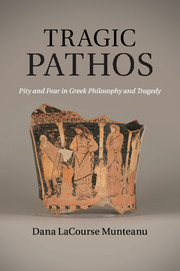Book contents
Appendix - Catharsis and the emotions in the definition of tragedy in the Poetics
Published online by Cambridge University Press: 05 December 2011
Summary
Before ending this book, I feel obliged to examine several interpretations of the definition of tragedy in the Poetics, even though the topic is not essential to my analysis of the tragic emotions, which has concentrated on the psychology of the audience and on pity and fear as internal responses to suffering in tragedies. The fascination with the notion of catharsis, comes to a great degree, it seems to me, from a hope that the enigmatic word in the definition of tragedy hides a full reply to Plato's critique of the effect of poetry in the Republic, and that it also provides an ethical redemption of the audience either through the emotions or despite them. On these things, otherwise, Aristotle has been generally – and stubbornly – silent in the Poetics. My study has had a rather practical purpose, namely to reconstruct some concrete Aristotelian features of tragic pity and fear.
Aristotle reshaped traditional ideas about tragedy to assess his own opinions about the structure and effect of tragic genre. Perhaps no other subject has caused as much scholarly debate as the Aristotelian definition of tragedy, which associates pity and fear, the emotions commonly reported as the audience's response to tragedy in Greek culture, with the enigmatic notion of catharsis:
ἔστιν οὖν τραγῳδία μίμησις πράξεως σπουδαίας καὶ τελείας μέγεθος ἐχούσης, ἡδυσμένῳ λόγῳ χωρὶς ἑκάστῳ τῶν εἰδῶν ἐν τοῖς μορίοις, δρώντων καὶ οὐ δι᾽ ἀπαγγελίας, δι᾽ ἐλέου καὶ φόβου περαίνουσα τὴν τῶν τοιούτων παθημάτων κάθαρσιν. (Po. 6.1449b24–8)
Tragedy, then, is mimesis of an action which is elevated, complete, and of magnitude: in language embellished with distinct forms in its sections, [using] enactment and not narrative, and through pity and fear producing the catharsis of such emotions.
Controversy surrounds the significance of catharsis and its connection with the tragic emotions, since the term is not further elucidated in the treatise. In the literature preceding Aristotle, the word and its family cover a series of medical, religious, and philosophic connotations. Various translations have been accordingly attempted for catharsis in the Poetics, from cleansing, to purification, to intellectual clarification. Furthermore, although the term occurs in other Aristotelian works, and most notably in the Politics, Book Eight, in a passage that deals with music, the relationship between these texts and the Poetics is not entirely clear.
- Type
- Chapter
- Information
- Tragic PathosPity and Fear in Greek Philosophy and Tragedy, pp. 238 - 250Publisher: Cambridge University PressPrint publication year: 2011



